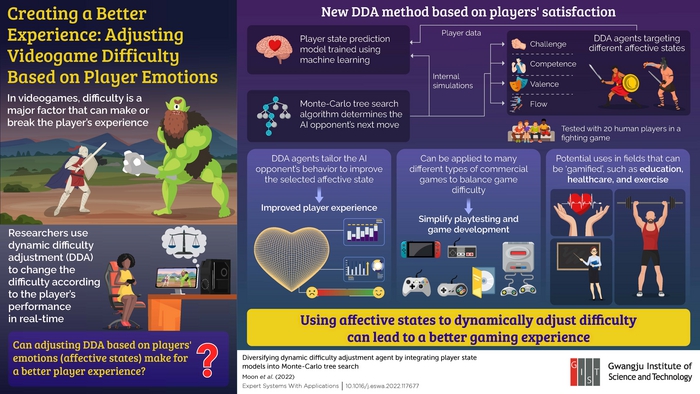 |
| September 27, 2022 | Volume 18 Issue 36 |
Designfax weekly eMagazine
Archives
Partners
Manufacturing Center
Product Spotlight
Modern Applications News
Metalworking Ideas For
Today's Job Shops
Tooling and Production
Strategies for large
metalworking plants
Video game difficulty adjusted based on player emotions -- not just performance -- in new scientific model
Difficulty is a tough aspect to balance in video games. Some people prefer games that present a challenge, whereas others enjoy an easy experience. To make this process easier, most developers use dynamic difficulty adjustment (DDA).
The idea of DDA is to adjust the difficulty of a game in real time according to player performance. For example, if player performance exceeds the developer's expectations for a given difficulty level, the game's DDA agent can automatically raise the difficulty to increase the challenge presented to the player. Though useful, this strategy is limited, because only player performance is taken into account -- not how much fun the player may be having.
In a recent study published in the journal Expert Systems With Applications, a research team from the Gwangju Institute of Science and Technology in Korea decided to put a twist on the DDA approach. Instead of focusing on the player's performance, they developed DDA agents that adjusted the game's difficulty to maximize one of four different aspects related to a player's satisfaction: challenge, competence, flow, and valence.

The novel approach to dynamic difficulty adjustment (DDA) takes into account the player's emotions during gameplay instead of only the player's performance. The goal is to provide a different -- and hopefully better and more engaging -- player experience. [Credit: Gwangju Institute of Science and Technology]
The DDA agents were trained via machine learning using data gathered from actual human players, who played a fighting game against various artificial intelligences (AIs) and then answered a questionnaire about their experience.
Using an algorithm called Monte-Carlo tree search, each DDA agent employed actual game data and simulated data to tune the opposing AI's fighting style in a way that maximized a specific emotion, or "affective state."
"One advantage of our approach over other emotion-centered methods is that it does not rely on external sensors, such as electroencephalography," said Associate Professor Kyung-Joong Kim, who led the study. "Once trained, our model can estimate player states using in-game features only."
The team verified, through an experiment with 20 volunteers, that the proposed DDA agents could produce AIs that improved the players' overall experience -- no matter their preference. This marks the first time that affective states are incorporated directly into DDA agents, which could be useful for commercial games.
"Commercial game companies already have huge amounts of player data. They can exploit these data to model the players and solve various issues related to game balancing using our approach," said Kim. Worth noting is that this technique also has potential for other fields that can be "gamified," such as healthcare, exercise, and education.
The paper was made available online on June 3, 2022, and will be published in Volume 205 of the journal on Nov. 1, 2022.
Source: Gwangju Institute of Science and Technology
Published September 2022
Rate this article
View our terms of use and privacy policy
